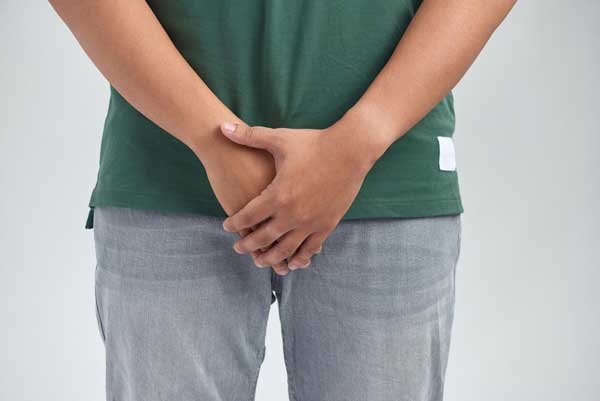If you’re over 50, you’ve probably wondered why your prostate seems to act up, causing discomfort and interruptions in your daily life. The good news is that there’s a simple mineral that might just help your prostate – zinc. Zinc isn’t a magic fix, but rather a dependable companion, working quietly in the background. Zinc helps regulate specific hormones, reduces inflammation, and maintains the health of your prostate cells.

So let’s get into more details and see how this essential mineral helps shrink an enlarged prostate and improve your overall prostate health.
Zinc Inhibits Conversion of Testosterone into DHT
One key way zinc accomplishes this is by inhibiting the conversion of testosterone into dihydrotestosterone, or DHT. DHT is a hormone that plays a critical role in the growth of prostate cells. In excessive amounts, it can lead to the proliferation of prostate cells and potentially contribute to the enlargement of the prostate.
So now let’s see one by one how zinc can be helpful against BPH or an enlarged prostate:
1. Zinc Helps Reduce Inflammation in Your Prostate
Zinc can help reduce inflammation in the prostate in a few ways:
- First, it acts like an antioxidant – a shield against harmful free radicals that could make your prostate swell up. Zinc helps your body get rid of these troublemakers, which helps calm down the inflammation.
- Second, zinc has been found to inhibit the activity of specific inflammatory markers in your body, such as cytokines and prostaglandins, and stop them from causing inflammation.
- Third, zinc also helps your body’s defense system work just right. When the defense system is too active, it can make things worse, so zinc helps calm it down and prevent too much inflammation in the prostate.
- Lastly, zinc helps keep hormones like testosterone in balance. When hormones are out of balance, it can make the prostate get bigger, so by helping with hormone balance, zinc indirectly reduces inflammation in an enlarged prostate.
2. Zinc Supports Healthy Prostate Cell Function
The prostate cells sometimes need to divide and grow to replace old or damaged ones. Zinc helps regulate this process, preventing overgrowth of prostate cells and facilitating the repair of damaged ones.
Zinc is also essential for reading the instruction manual of each cell, which we call DNA. Just like we follow instructions to assemble something correctly, cells follow DNA’s instructions. Zinc helps make sure they follow these instructions accurately, so the prostate cells are less likely to overgrow.
3. Zinc Strengthens the Immune System
Zinc acts as a support system for the body’s defense mechanism, enhancing its ability to fight inflammation and infections within the prostate gland.
In fact, a study published in the Journal of the National Cancer Institute in 2003 showed that many people who had prostate cancer were also deficient in zinc.
Zinc is essential for the development and function of immune cells, including white blood cells, T-cells and natural killer cells. These cells are the frontline defenders against infections. Zinc helps these cells mature and function properly, and that means having a significantly lower risk of developing prostate-related issues and a lower risk of developing urinary tract infections.
Zinc has also been shown to have antimicrobial properties. It can interfere with the growth and function of certain bacteria and viruses, making it harder for them to thrive and cause infections in the prostate or urinary system.
Zinc also acts as a catalyst in many enzymatic reactions in the body, including the ones that contribute to DNA synthesis, cell division, and the regulation of immune response.
4. Zinc Enhances Apoptosis
Apoptosis is basically our body’s natural process to kill overly grown, dead or abnormal cells and get rid of them. In BPH, the prostate gland undergoes abnormal growth, leading to an increase in the number of prostate cells. That’s when urinary symptoms begin to show up, like difficulty urinating, urinary tract infections, and other issues.
Luckily, zinc is involved in maintaining the balance between cell growth and cell death in the prostate. It ensures that the prostate gland doesn’t grow excessively and that old or damaged cells are effectively removed through apoptosis.
In fact, studies show that zinc deficiency can disrupt the delicate balance between the formation of new cells and the death of old cells in the prostate, which often leads to an enlarged prostate.
So when you take zinc via diet or supplements, it can greatly reduce your risk of developing BPH.

Where to Find Zinc
There are many foods that are rich in zinc, such as oysters, steak, chicken, nuts, beans, and healthy grains like oatmeal and whole wheat bread. Including these foods in your diet can be like giving your prostate the nutrients it needs to stay healthy and possibly avoid getting too big.
And well, if you think you can’t get enough zinc with diet, you can go for zinc supplements. There are various forms of zinc supplements such as zinc gluconate, zinc sulfate, zinc citrate, zinc picolinate, and zinc orotate. Your doctor can help you find what suits you the most according to your individual needs and health conditions.
Here are a few more precautions and dietary recommendations to stick with if you have an enlarged prostate:
1. Limit Salt Intake
Consuming too much sodium salts can lead to fluid retention in your body, increase your blood pressure, trigger inflammation in your body, and even cause irritation in your urinary tract. So it’s a good idea to limit how much salt you consume.
2. Avoid Red Meat
Red meat, especially processed and fatty cuts, are usually high in saturated fats and cholesterol. They may also contain added hormones or antibiotics which can potentially affect your hormone levels, including testosterone and DHT.
Moreover, when red meats are processed, cooked, grilled or fried at high temperatures, they tend to produce advanced glycation end products, or AGEs. These compounds are known to speed up your aging process and increase inflammation in your body – both of which can potentially worsen your symptoms of BPH or urinary tract infections. So it’s best to stick with leaner cuts of meat and use healthier cooking methods.
3. Dairy Products
This one’s a bit tricky. First of all, too many saturated fats and cholesterol are generally considered bad for health. But in the case of BPH, you may need more of them, since your body needs saturated fats to make hormones, especially testosterone. So taking full fat dairy products can actually help your body achieve a better balance in your sex hormones.
On the other hand, if you are already obese, have heart disease, and have high cholesterol and high triglyceride levels in your body, adding high-fat products may not be a good idea. So you can say that for most BPH patients, avoiding high-fat dairy is a much better idea. But feel free to discuss that with your doctor to get personalized recommendations according to your condition.
4. Alcohol
Alcohol is found in drinks like beer, wine, and liquor. Having too much of it can trigger inflammation in your body, including your prostate. So it’s best to avoid drinking too much.
Red wine, on the other hand, is a much better option than beer or liquor according to many experts. It’s rich in a compound called resveratrol which is a very powerful antioxidant that helps clean your arteries and reduce inflammation in your body. But it’s still a good idea to ask your doctor about how much of it you can consume.
Conclusion
In conclusion, zinc is an essential mineral that can provide several benefits for supporting prostate health and potentially shrinking an enlarged prostate. It helps inhibit DHT production, reduce inflammation, support healthy cell function, strengthen the immune system, and regulate apoptosis. Eating zinc-rich foods or taking supplements under medical guidance may help improve prostate symptoms in some men with BPH. However, always consult your doctor first, as zinc may interact with certain medications or health conditions. Maintaining a balanced diet, managing stress, staying active, and getting screened regularly are also key for lifelong prostate health. Speak to your healthcare provider to develop a personalized plan for keeping your prostate healthy as you age.
